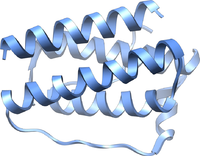
Photo from wikipedia
PurposeLeptin is an adipokine which regulates appetite and energy balance through a mechanism partially mediated by neurotensin (NT) in central nervous system. Besides acting as a neurotransmitter, NT is expressed… Click to show full abstract
PurposeLeptin is an adipokine which regulates appetite and energy balance through a mechanism partially mediated by neurotensin (NT) in central nervous system. Besides acting as a neurotransmitter, NT is expressed in human intestine where it promotes fat absorption and its circulating levels associate with obesity, type 2 diabetes mellitus (T2DM) and cardiovascular disease. Whether a relation exists between circulating leptin and NT levels has not been investigated yet. The aim of this study was to test the hypothesis of an association between plasma leptin and NT concentration in adults with or without T2DM.MethodsWe recruited a population of 72 subjects (M/F: 39/33; age: 49.5 ± 10.6 years; BMI: 26.5 ± 4.7 kg/m2) including individuals with T2DM (n = 32) referring to our Diabetes Outpatient Clinics, Sapienza University of Rome, and healthy controls. Study participants underwent metabolic characterization; plasma leptin was measured by MILLIPLEX, Luminex, and proneurotensin (proNT), a stable precursor of NT, by chemiluminometric sandwich immunoassay.ResultsCirculating median (25°–75°) leptin levels were 2.75 (1.27–4.93) ng/mL and did not differ between T2DM and non-diabetic subjects. Leptin concentration directly correlated with proNT (r = 0.41; p = 0.015); higher leptin levels were also associated with age, male gender, obesity, higher HOMA-IR, systolic blood pressure and C-reactive protein. Belonging to the highest pro-NT quartile correlated with greater leptin levels independent of age, gender and other confounders (r2 = 0.82, p = 0.02).ConclusionsCirculating leptin is associated with higher proNT levels independent of diabetes, obesity and metabolic syndrome components; besides its effects on central leptin signaling, NT may influence energy balance by modulating circulating leptin concentration likely through a mechanism involving gut fat absorption.
Journal Title: Journal of Endocrinological Investigation
Year Published: 2018
Link to full text (if available)
Share on Social Media: Sign Up to like & get
recommendations!